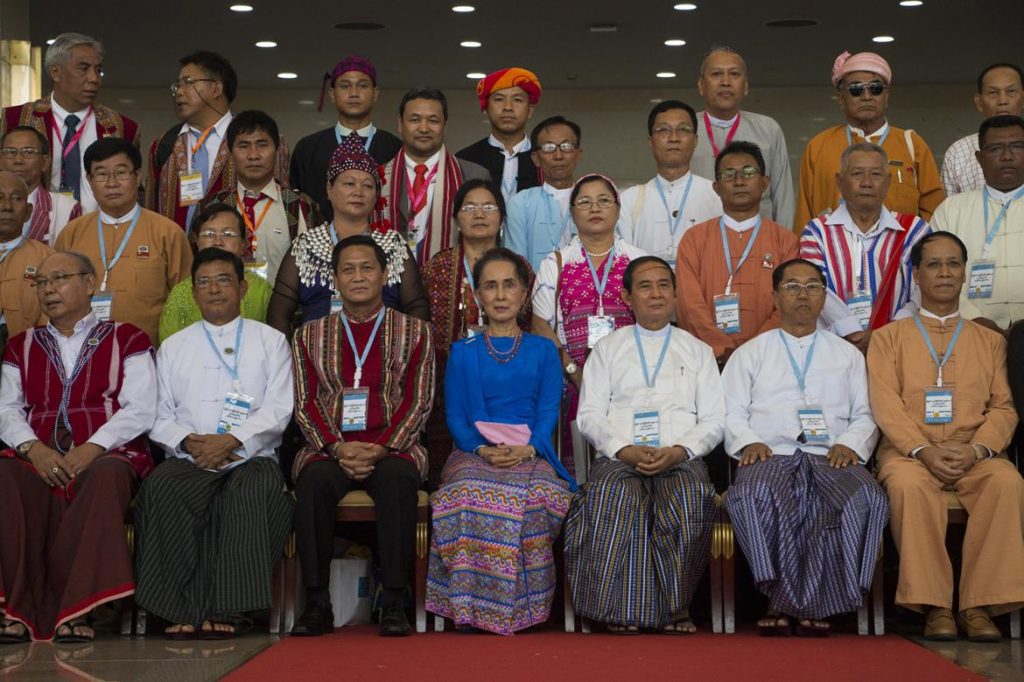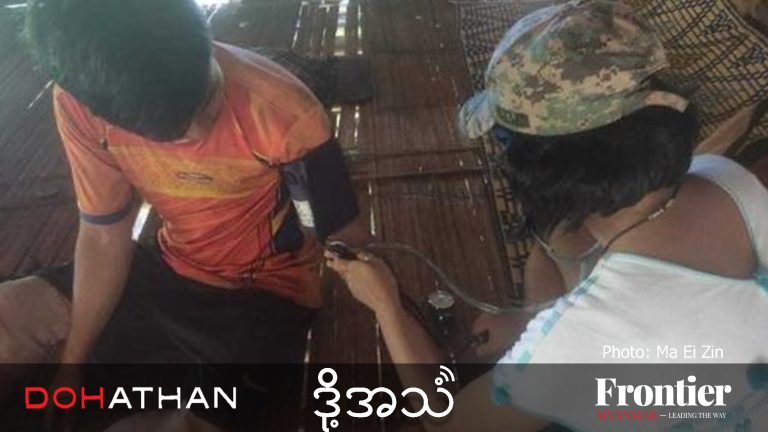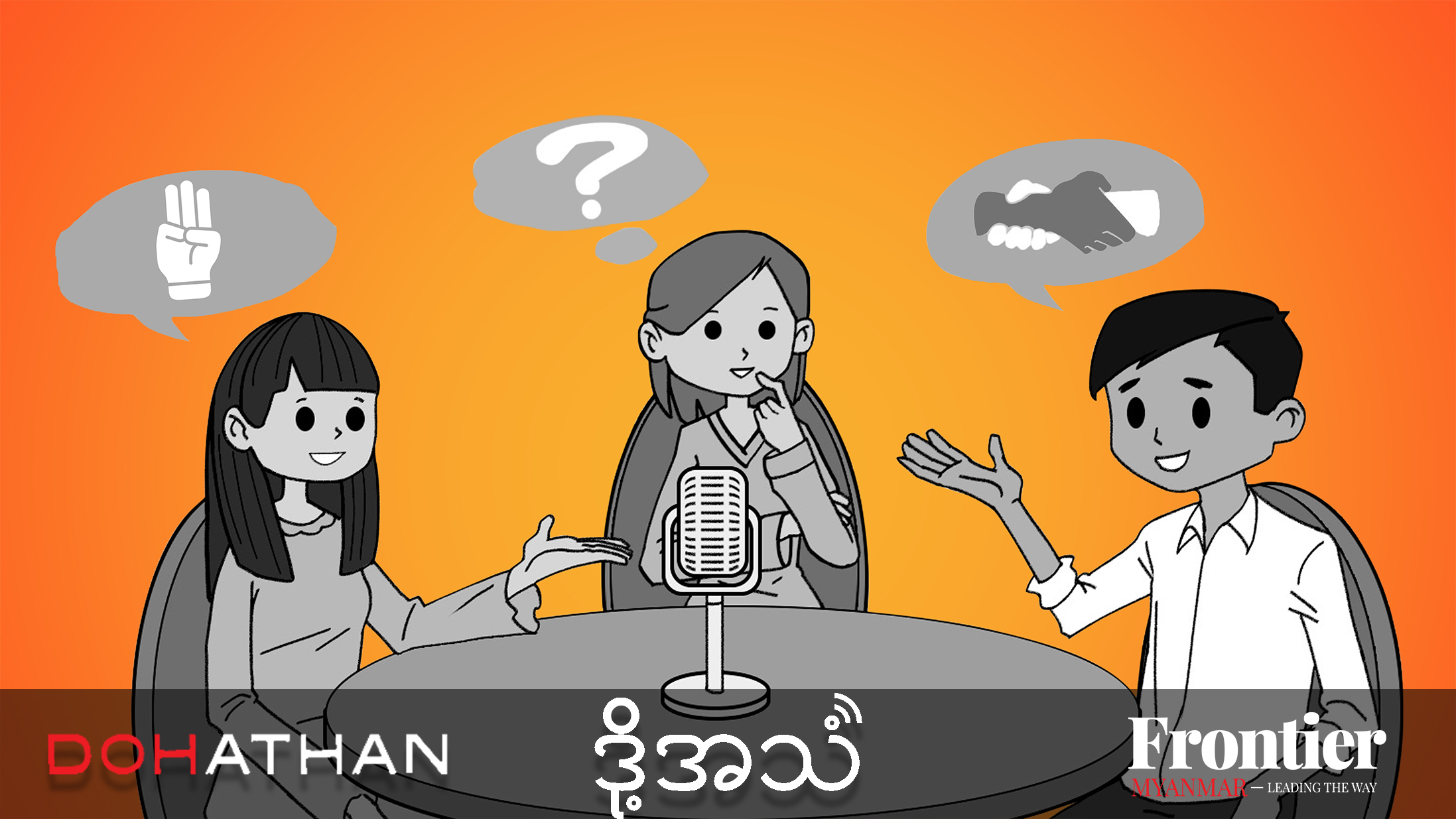Ethnic leaders and negotiators say that the government and military have blocked discussion of key political and economic issues at the 21st Century Panglong Union Peace Conference that opened today in Nay Pyi Taw.
By KYAW LIN HTOON | FRONTIER
ANALYSTS AND ethnic negotiators say there is little chance of progress at peace talks that open in Nay Pyi Taw today and have called for a complete review of the framework for the political dialogue process to avoid a potential deadlock.
Hundreds of government, military and parliamentary delegates as well as representatives of ethnic armed groups are gathering in the capital today for the opening of the 21st Century Panglong Union Peace Conference, which is expected to run for six days.
Only armed groups that have signed the nationwide ceasefire are able to attend as participants, while non-signatories can be invited to observe the talks.
Delegates are supposed to negotiate towards a Union Peace Accord that will address the root causes of Myanmar’s long-running conflicts, including by introducing a federal system of government.
Support more independent journalism like this. Sign up to be a Frontier member.
But observers have expressed concern at the restrictions on the topics that can be discussed at this week’s Panglong conference, which will be the third held under the National League for Democracy government.
Min Aung Htoo, the coordinator for Mon State at Nyein Foundation, a peacebuilding NGO, said he sees little chance of progress with the current peace architecture.
“If it continues this way, the process could be even longer than Nyaunghnapin,” he said, referring to the National Convention that the military regime called to draft a new constitution, which took more than 14 years to complete its work. “It might take more than 20 years with these [Panglong] conferences.”
Proposed topics rejected
At a July 9 meeting the 48-member Union Peace Dialogue Joint Committee announced that only 12 of 32 proposed peace topics had been approved for formal consideration at the Panglong conference.
The UPDJC was created in October 2015 and is responsible for holding and overseeing the political dialogue process, including convening the peace conferences.
Its 15-member secretariat features five members from the Tatmadaw, government and national parliament; five selected by the ethnic armed groups; and five chosen by registered political parties.
Before each conference, this secretariat is responsible for reviewing policy papers submitted by Thematic Working Committees and producing a single draft policy paper. Once approved by the full UPDJC, this paper is then submitted to the Panglong conference. Approval at the conference means the text becomes part of the Union Peace Accord.
Most of the points rejected earlier this week were related to politics and the economy. TWCs had proposed seven political and 11 economic topics, of which only two and one were approved, respectively.
The political topics both relate to gender equality, including a proposal to draw a policy to ensure equal rights for all genders and to eliminate discrimination based on gender, and for women to hold at least 30 percent of positions in politics. The UPDJC rejected other gender-related proposals regarding protection for women improving the capacity of women.
On the economy, a proposal related to taxation and sharing of income from natural resources was approved for discussion. The other approved topics are from the working committees concerned with social affairs and land and the environment.
Under the political dialogue framework, if a bloc within the UPDJC Secretariat objects to a proposed topic then it cannot be discussed at the conference. Most of the rejected topics were blocked by delegates from the military, government and parliament bloc, sources with knowledge of the discussions said.
This has frustrated negotiators from the ethnic armed groups and some political parties who attended the two-day UPDJC meeting earlier this week.
For the past year the armed groups have been preparing for the talks by holding national-level political dialogue meetings and attending thematic working committees to develop and finalise proposals for discussion at Panglong. Representatives told Frontier that they were dismayed by how few had made it through the UPDJC vetting process.
Naing Aung Ma Ngay, a spokesperson for the New Mon State Party, which signed the nationwide ceasefire in February, said the group had low expectations for the Panglong conference.
“Not only us, but also the other ethnic armed groups are here with a resolution to discuss political topics such as basic rights, ethnic minorities’ rights and so on,” he said. “I hoped to get good news after travelling to Nay Pyi Taw [for the UPDJC meeting], but it didn’t happen.”
He said the NMSP was concerned at the direction of the peace process under the existing political dialogue framework. He said the provision that enables one group to block any discussion of a topic at Panglong is just one of the many problems.
“Now we see the whole process … we know the the framework needs to be reviewed and adjusted,” Aung Ma Ngay said. “Ethnic groups, civil society groups and the communities of each ethnic group have been preparing for this conference for about a year. But if we can’t even discuss the topics what we want, then there is clearly a need to review the whole process.”
One negotiator who spoke on condition of anonymity said the biggest problem with the peace process was the lack of political will from government and Tatmadaw leaders. “If they really want peace and the establishment of a Federal Union, all of the obstacles in the process could have been overcome,” he said.
The ‘peace banquet’
Some civil society groups are also campaigning for a new framework for peace negotiations. In the first week of July, the Karen Peace Support Network said in a report that a “new framework must be set up where political dialogue, negotiations, and resolutions are not constrained by the 2008 constitution”.
The report, Burma’s Dead-End Peace Negotiation Process, analyses the process by using dialogue over land management powers as a case study, tracing the original demands and negotiations over land from the Karen ethnic-level national political dialogues held in 2017.
The land policy principles agreed during the 2nd Panglong peace conference in May 2017 contradict the recommendations developed through Karen national-level political dialogues, which clearly called for local ownership and state land management powers.
“Building on the 2008 Constitution, the Burma Army is clearly using the peace negotiation process further entrench military rule and expand their control into ethnic areas,” the report said.
The 2017 Karen national-level political dialogue resulted in 69 land policy recommendations. However, the UPDJC policy paper presented to the Panglong conference last year contained just 11 points focusing on the land sector, none of which moved beyond the 2008 constitution or existing land-related legal frameworks.
Analysts said the military’s influence over the peace process was the key barrier to progress. “We can see clearly that the Tatmadaw doesn’t understand where this whole [peace] process is heading or what it means,” said U Ye Tun, a former Pyithu Hluttaw representative for Hsipaw in Shan State from the Shan Nationalities Democratic Party. “If the government really wants peace, it must be able to organise the Tatmadaw to understand the situation.”
U Than Soe Naing, a prominent analyst and former Burma Communist Party member, said he had begun referring to the Panglong conference as the “peace banquet”, because delegates were unlikely to do much other than spend time eating.
“Of the three conferences organized by the NLD government, this is the one for which I have the least hope of something significant happening,” he said. “It doesn’t look like it will result in any strong principles for a new federal country.”







